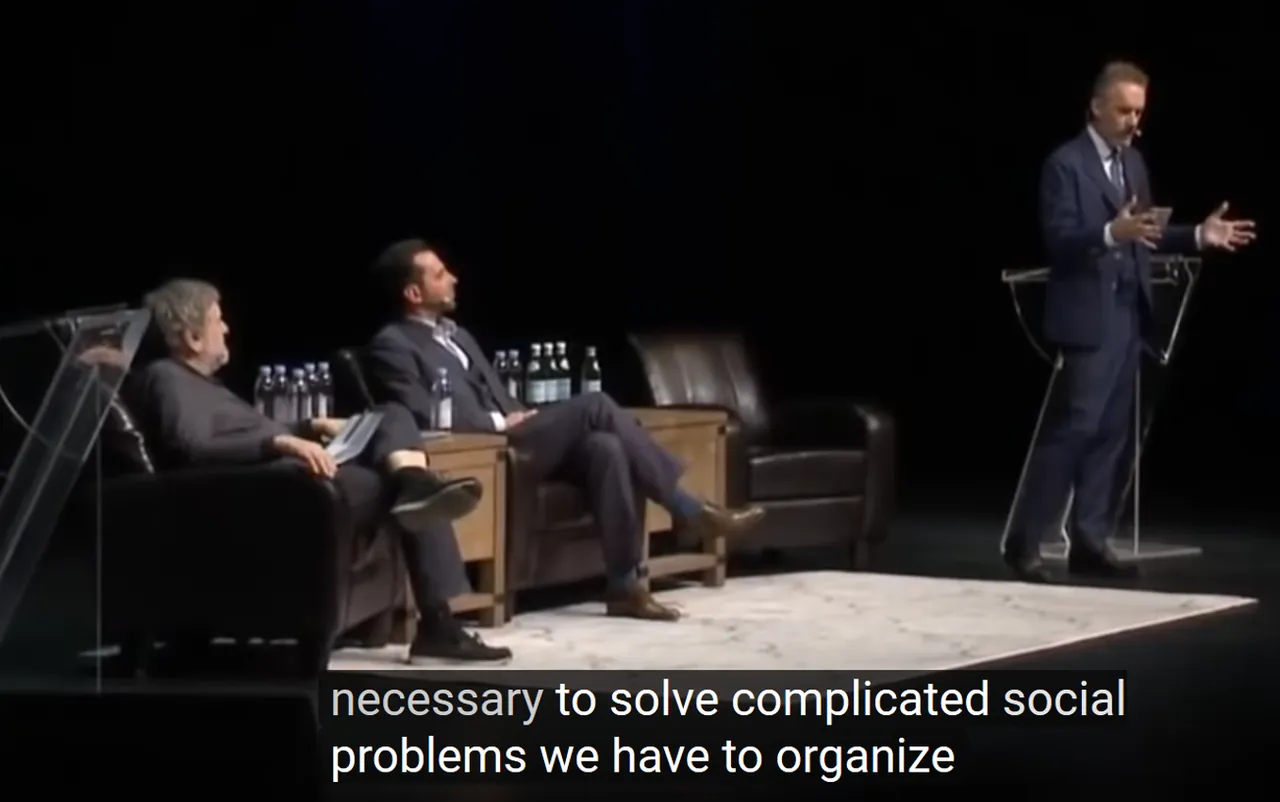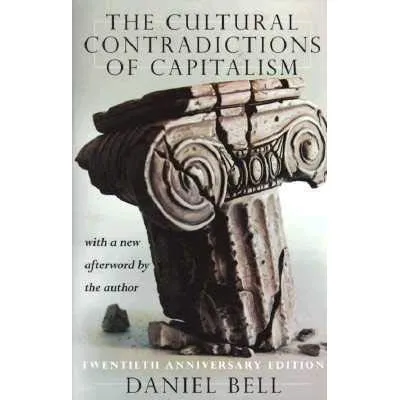Here are some notes I took while watching a recording of the recent "debate of the century" between S. Zizek and Jordan B Peterson.
The debate, organized in Toronto, was titled "Happiness: Capitalism vs Marxism".
The organizers had invited S. Zizek on the assumption that he'll be the one "defending Marxism" while Jordan Peterson was expected to defend capitalism.
The format was not very conducive to what the organizers had in mind. Each debater had prepared separately so we began listening to parallel discourses, not to a proper debate.
Jordan B. Peterson
Jordan Peterson had the first intervention and his words made me immediately think of the steem experience.

Jordan forcefully argues for the need for hierarchies of competence. Steem has a hierarchy of wealth instead. While this is not necessarily a bad thing, Jordan draws a clear difference between wealth and competence by giving the example of a dissolute aristocrat who'd live off a largely self-run estate while wasting its profit on gambling and prostitutes.
While that is a bad thing, we shouldn't go as far as drawing the conclusion that "hierarchies are bad" and proceed to rejecting any and all hierarchies. "Hierarchical structures are necessary to solve complicated social problems, we have to organize in some manner.", he says
The implicit assumption of Steem was that the stake hierarchy would become a functional hierarchy as well. We saw that reality did not quite borne out that initial assumption and this was probably best explained in @noisy's seminal article Why our way of distributing Steem by voting sucks, why it does not scale and how we can improve this situation from 8 months ago.
Just like the "dissolute aristocrat" (from Peterson's example) is wasting his fortune on gambling and prostitutes rather than managing competently his rich estate, a significant number of whales on Steemit seem mostly interested in abusing the system rather than curating good content.
For most of his introductory speech Peterson poked torpedo-sized holes in the intellectual flank of Marx's and Engels's Communist manifesto ... which was the theme of the debate and probably what the organizers expected him to do.
Slavoj Zizek
Zizek's introductory speech on the other hand put the philosopher resolutely at odds with the frame given by the organizers. He went completely "off script", as far as the organizers were concerned while at the same time staying completely "on script", technically speaking. As he's not a native English speaker, he had prepared his intervention and read it from a ream of paper in heavily accented English (the automatic YouTube speech-to-text engine had a lot of trouble to cope)
I would have frankly been surprised to see a philosopher from Eastern Europe defend Marxism and why the organizers thought otherwise begs askance ... Zizek is far too bright to stay in such an non-enviable intellectual "box".
Zizek did not particularly attack capitalism from an ideological position, but he pointed at its obvious flaws with brilliance. His reasoning was much more generic and theoretical (less pragmatic) than Peterson's, so I only managed to apply some of his thoughts to steem. Yet for people who like to think deeply, who like philosophy, listening to him is nevertheless very rewarding.
Zizek started by dismissing the relevance of discussing Marxism and capitalism in the narrow frame of "happiness", a very problematic concept for a creature as complex as Homo sapiens
China as the product of a Marxist - Capitalist synthesis
With Socratic wisdom, Zizek observed that while communists attack capitalism and vice-versa, the most striking success when it comes to what most people would call "desirable outcomes" (and the Chinese hierarchy would call "harmonious society") has happened during the past decades in China, which combined the "wild dynamic" of capitalism with the "strong totalitarian state" of Marxism.
On the deconstruction of authority
If capitalism is approached as "freer", less bound to an authority than Marxism, he observed that "once traditional authority loses its substantial power, it is not possible to return to it". Something like this happened in our free societies, who have shed the authority of religion, became emancipated only to realize that emancipation leads to a corroding "authority vacuum". "The origin of our crisis is the loss of our reliance on some transcended divinity (or "higher value"). If Everything is relative, then there is nothing to prevent us from indulging in our lowest tendencies."
This is actually not unlike what we see in decentralized settings, including Steem. Because the underlying ideology is overwhelmingly one of individual freedom and resistance to authority, we are experiencing first-hand the direct result: "circle jerking", "reward pool abuse", "bid bot abuse", "excessive self-voting" are, in the eyes of some and to a certain degree, our "lowest tendencies".
To correct these problems and avoid self-destructive nihilism I proposed a Steem Charter, to be adhered to on a voluntary basis and to become our self-chosen authority.
One the most powerful thoughts Zizek presented though was the following: Cultural Marxist manifestations (what Jordan Peterson brilliantly combats and which also happen to have given rise to the "alt-right" movement) are the outcome of the immanent dynamic of capitalism."
In a corroborating statement, he referenced Daniel Bell's "Cultural contradictions of capitalism", a book from the mid seventies where the author wrote: "the unbounded drive of modern capitalism undermines the moral foundations of the original Protestant ethics"

Selected Amazon reviews: "He thought about issues in the 1970s that are affecting the country now." / "Had to read with a dictionary in hand...very scholarly, but better if an economics major."
What is interesting is that Zizek defends a specific aspect of Marxism - the authoritarian and hierarchical aspect - which happens to be one of the main arguments of Peterson as well. In a sense, they both agree that our current societies are "too flat" or, as Zizek puts it "todays capitalism equalizes us too much"
Yet he nuances by saying - perhaps in contrast with Peterson - that the hierarchy should not be based on "competence" but rather by an external source of authority. To quote him quoting Kirkegaard, "Christ was justified by being the Son of God, not by being more competent"
This is in a sense what I'm trying to advocate with the "Steem Charter" - creating a source of authority which might appear arbitrary at first but which could become "ours" precisely because it will be the product of our conscientious choices. This source of authority, our local compass, is needed to complement the mechanics of the blockchain.
Conclusion
Well, there's still 1h 40' of debate I have to listen to so there's no conclusion as yet, but I think it's a great opportunity for everybody who wants to reflect in general and about steem in particular.
Here is a link to the recording:


If you know what witnesses are and agree that people commited to keeping this blockchain ticking play an important role ...

(by simply clicking on the picture - thanks to SteemConnect)

Related posts
- Understanding blockchain's social impact
- Steem Social Lab: we need a "charter"
- Spammers gonna spam - focus on original content!
Other posts you might enjoy:
Blockchain, Crypto and Society
- Blockchain and the End of the Western Civilization
- Why Blockchain Is a Revolution
- Blockchain revolution: Money and Credit
- Small worlds
- The Press needs to be Freed from the Tyranny of Money
- Game Theory 102 - Blockchain and Cooperative Games
Steem ecosystem
- How I learned to stop worrying and love the Bid Bots
- Steem crypto-economics
- Steemit and the Fractal Society
- Game Theory 101 - Schelling point or "Why Steemit.com is important"

You might also want to check out
- the Witness account, @lux-witness (and even approve it, perhaps)